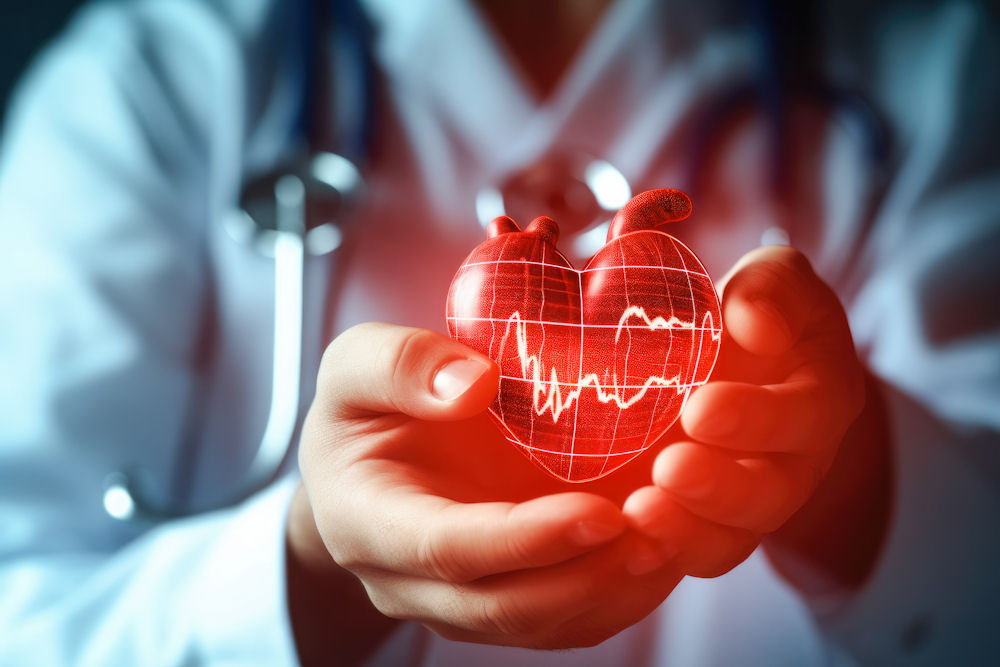How Does Intoxication Affect the Cardiovascular System?
February is both American Heart Month and Heart Health Awareness Month, a time dedicated to raising awareness about cardiovascular health and the factors that influence it. While most people associate heart health with diet and exercise, other factors also play a role in the health of not just the heart but the cardiovascular system as a whole.
One such thing that plays a significant role in overall heart health is alcohol consumption. Excessive alcohol consumption can contribute to cardiovascular issues such as high blood pressure and heart disease, among others.
So, with February being a month focused on heart health, what better time than now to take a deeper look at how alcohol affects the entire cardiovascular system and answer the question of how does alcohol affect the heart?
How Does Alcohol Affect the Heart?
Speaking of the heart, let’s start there. While there are some studies out there that say that moderate drinking can offer some health benefits, especially as it relates to red wine, for the most part, alcohol consumption as a whole can put an added strain on the heart. This is particularly true as it relates to excessive drinking. Chronic and excessive drinking can cause issues such as:
- Increased risk of heart disease
- High blood pressure
- Persistent damage to the heart and blood vessels
Damage to the heart and blood vessels can be particularly dangerous as it can lead to potentially life-threatening conditions such as heart attack, arrhythmia, and stroke.
How Does Alcohol Affect the Cardiovascular System?
Then there’s the cardiovascular system as a whole, which is made up of the heart, blood vessels, and blood circulation. As you can imagine, the cardiovascular system has to be “firing on all cylinders” for our body and brain to perform and function normally.
Drinking alcohol, especially in excess can disrupt the balance of the cardiovascular system in several different ways such as:
- Weakening the heart muscle: Over time, alcohol can lead to a condition known as cardiomyopathy, where the heart muscle weakens and struggles to pump blood effectively.
- Causing irregular heart rhythms: Alcohol affects the electrical signaling in the heart, increasing the risk of arrhythmias, including atrial fibrillation.
- Increasing the heart rate: Alcohol consumption can lead to an increased resting heart rate, which over time can contribute to cardiovascular strain.
- Interfering with oxygen transport: Alcohol-induced dehydration and toxicity can reduce oxygen transport in the bloodstream, making the heart work harder to circulate oxygenated blood.
- Contributing to plaque buildup: Heavy drinking can accelerate the development of atherosclerosis, where fatty deposits build up in the arteries, restricting blood flow and leading to cardiovascular diseases.
- Increasing blood pressure: Alcohol consumption can lead to a temporary increase in blood pressure, which can become chronic with prolonged use.

How Does Alcohol Cause High Blood Pressure?
Speaking of blood pressure, alcohol consumption, over time, can increase the risk of hypertension, also known as high blood pressure. This can happen for several different reasons:
- Increased stress on blood vessels: Alcohol triggers the release of stress hormones that cause blood vessels to constrict, leading to elevated blood pressure.
- Increased caloric intake and obesity: Alcohol is high in empty calories, contributing to weight gain, which is a known risk factor for hypertension.
- Disrupting kidney function: The kidneys play a crucial role in regulating blood pressure. Alcohol interferes with their ability to manage fluid balance and blood pressure effectively.
- Increased inflammation: Chronic alcohol consumption leads to inflammation within blood vessels, making them more prone to damage and increased pressure levels.
- Reduction in nitric oxide production: Alcohol consumption decreases nitric oxide levels, which are essential for blood vessel dilation and proper circulation.
Hypertension, when not properly addressed, can cause an increased risk of heart disease, stroke, and other cardiovascular complications such as cardiovascular disease.
Alcohol and Cardiovascular Disease
Cardiovascular disease is a very serious condition that can become deadly if not properly addressed by a doctor or medical professional. As we touched on, regularly drinking alcohol or drinking alcohol in access can greatly increase the risk of cardiovascular disease which can result in potentially life-threatening issues such as:

Heart Attack
Excessive drinking contributes to heart attacks by increasing blood pressure, promoting arterial plaque buildup, and causing irregular heart rhythms. The combination of these factors makes the heart more vulnerable to sudden cardiac events.
Irregular Heartbeat
Also known as Arterial fibrillation or AFib, an irregular heartbeat is a side effect associated with heavy or prolonged drinking. Alcohol interferes with the heart’s electrical activity, leading to the development of heart rhythm disorder. When left untreated, AFib can cause blood clots, stroke, and heart failure.
Alcoholic Cardiomyopathy
Alcoholic cardiomyopathy is a condition that occurs as a result of a weakened and enlarged heart muscle brought on by prolonged alcohol use. The condition reduces the ability of the heart to pump blood effectively and can lead to issues such as shortness of breath, swelling in the legs, fatigue, and, when left untreated, heart failure.
Weakened Heart Muscles
Chronic alcohol consumption can deteriorate the strength of heart muscles, making it harder for the heart to circulate blood. This can result in fatigue, dizziness, and an increased risk of cardiac arrest.
Stroke
Alcohol increases the risk of both ischemic (caused by blood clots) and hemorrhagic (caused by bleeding) strokes. Additionally, heavy drinking contributes to high blood pressure, atrial fibrillation, and blood vessel damage, all of which also elevate the risk of a stroke.
How Much Alcohol Is Too Much?
The Centers for Disease Control and Prevention (CDC) defines the various levels of drinking as follows:
- Moderate drinking: 2 drinks or less a day for men and 1 drink or less a day for women.
- Heavy drinking: Eight or more drinks for women, or 15 or more drinks for men during a week.
- Binge drinking: Four or more drinks for women, or five or more drinks for men during an occasion.
Exceeding the guidelines for moderate drinking and moving into either the heavy or binge drinking categories significantly increases the risk of cardiovascular disease and other health issues.
Can You Reverse Damage to the Cardiovascular System?
Depending on how quickly you catch and address any cardiovascular issues, as well as the severity of the issues, damage can be treated and reversed. Even if the damage can not be fully reversed, it can still be mitigated and slowed down or stopped.
If you are looking to Reverse or mitigate any cardiovascular damage, consider doing the following:
- Quitting drinking: Stopping alcohol consumption can allow the heart and blood vessels to heal, reducing the risk of further complications.
- Changing your diet: A heart-healthy diet rich in fruits, vegetables, whole grains, and lean proteins can support cardiovascular recovery.
- Exercising regularly: Physical activity strengthens the heart muscle, improves circulation, and helps manage blood pressure.
- Managing stress: Stress-reduction techniques such as meditation, therapy, and deep breathing exercises can help lower blood pressure and improve heart function.
- Seeking medical treatment: In addition to everything listed above, sometimes medical treatment may also be needed. This is particularly true for more serious cardiovascular issues such as hypertension, arrhythmias, or cardiomyopathy.
- Getting routine check-ups: Along those lines of medical treatment, regular, routine checkups with your doctor or primary care physician can allow for proper monitoring of your heart health and prevent further complications caused by past alcohol consumption.
If your alcohol-related cardiovascular issues are a result of alcohol abuse and/or addiction, professional intervention may also be required. As part of addiction treatment, medical detoxification is done to flush out all the toxins associated with alcohol as well as any other harmful substance that may be in the body. This allows the body to begin the healing process.
Especially when it comes to alcohol detox, it is important that detoxing be done under the care and supervision of trained medical professionals due to the side effects associated with the process. Detoxing can be done at either a local medical facility, a dedicated detox center, or a treatment center that also provides detox services such as Immersive Recovery.
Both during detox and treatment, medications may be administered to help address both withdrawal symptoms and any other medical issues that may have arisen as a result of the alcohol abuse such as cardiovascular issues as part of a larger medication-assisted treatment (MAT) program.

Get Treatment for Alcohol Addiction at Immersive Recovery
If you or a loved one is struggling with alcohol addiction and its effects on heart health, seeking professional treatment is crucial. At Immersive Recovery, we offer comprehensive addiction treatment programs, as well as detox, for men designed to address both the physical and psychological aspects of alcohol dependence. Our evidence-based approach helps individuals regain control of their lives while improving their overall health and well-being.
Take the first step toward recovery today. Contact us to learn more about our personalized treatment programs and start your journey to a healthier heart and a better life.





